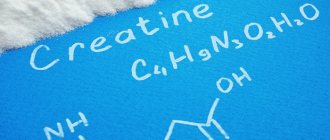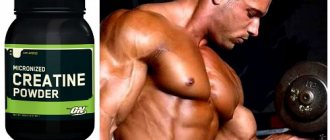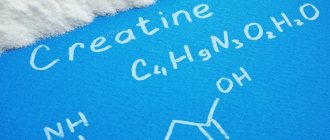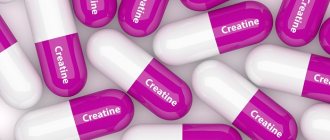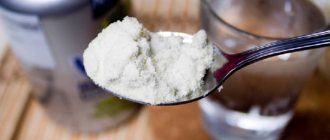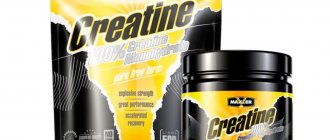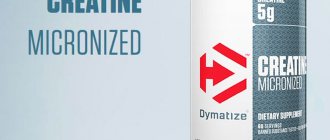All the nuances of taking creatine. Options with and without loading. What is the best thing to mix it with? Drink the supplement before or after training. Scientists know this substance as a nitrogen-containing carboxylic acid, and we (ordinary people and athletes) know it as creatine. The purpose of the component is to ensure energy metabolism in cells, increase strength and endurance. In general, without it it is impossible to imagine the normal functioning of our muscles and the body as a whole.
Creatine dosage regimens
As you know, creatine is produced in different chemical forms - it can be monohydrate, hydrochloride, nitrate, malate, citrate and others. Therefore, the dosage regimen for each form is different. Let's look at taking the most popular and affordable creatine - monohydrate.
How to Take Loading Creatine
This scheme is considered classic, and for a long time it was the only one. Its peculiarity lies in the increased dosage that the athlete uses in the first week of the course (loading period). After the period of using the increased dose, the maintenance period begins. The course of treatment lasts a month, after which the athlete takes a break of two to four weeks.
During the loading phase, the daily dose is 5-6 grams of creatine , which should be taken 4 times a day after meals or with other sports nutrition products, such as protein, gainer or amino acids. Can also be consumed with sweet juice.
Remember that carbohydrates are needed to absorb creatine molecules.
On training days, one dose should be taken immediately after training. During the maintenance phase, the dose of the sports supplement is reduced to 2 grams. Creatine is taken once a day. On training days it is best to take it after training, and on rest days - in the morning.
Taking without loading creatine
Reception without loading is a very workable, budget-friendly scheme. The fact is that the human body cannot absorb more than it needs, just like the amount of protein, synthetic hormones, fats and carbohydrates. This is what happens with creatine. The optimal dose of creatine is 2-3 grams. In people who eat properly, their supply of creatine is always replenished, which is why athletes often do not feel any visible effect from this sports supplement.
The regimen without loading lasts a month. The supplement is used once a day. On training days, the best time to take it is immediately after training.
The more carbohydrates you consume with the supplement, the more creatine will be absorbed (but don't overdo it, half a teaspoon of sugar will be enough, even if you take a triple dose of creatine).
On rest days, the sports supplement should be taken in the morning on a full stomach.
Which is better - creatine monohydrate or hydrochloride?
Not long ago, another debate erupted regarding which form of creatine is better. Many manufacturers are still not trying to come to terms with the fact that conventional monohydrate is on the leadership pedestal, so they are trying to introduce various improvements, such as an additional transport system, etc. Of course, they make sense, since they simply make it easier to use (no need to consume additional carbohydrates), but the significant excess in cost, which is due to production standards, still does not allow one to beat the monohydrate.
There are many forms of creatine, but here are the most popular:
- Crealkaline (has increased bioavailability);
- Anhydrous (contains more substance per serving);
- Tatrate (retains its properties longer);
- Citrate (gives a little more energy);
- Malate (better dissolved and absorbed), etc...
Cool article: creatine – which one is better to buy?
Basically, there is no difference between forms in terms of effectiveness, or it is minimal.
A similar situation occurred with creatine hydrochloride. At one time, the product caused quite a stir and generated a lot of discussions, although this was largely dictated by the manufacturer’s powerful marketing campaign. However, at the moment there is still no scientific research that would clearly establish the advantage of hydrochloride over monohydrate. Therefore, in the absence of a sufficient evidence base that would indicate the advantage of hydrochloride, the leadership still remains with the monohydrate.
By the way, monohydrate is the most economical and at the same time the most efficient product of all forms. The price of creatine in Moscow in our store can prove this to you. Once you look at the cost of the different forms, you will see for yourself how much they vary.
Best time to take creatine: before or after a workout?
Despite the fact that there are different opinions regarding the timing of taking a sports supplement (before or after a workout), as you probably already understood from the article, it is important to take creatine after a workout. This is due to the accumulation of the substance in the muscles and the provision of an anabolic effect for a long time after training during the period of fiber regeneration.
In addition, creatine increases blood flow to the muscles, thereby disrupting the body's water balance, removing fluid from the organs. I would like to draw attention to this, because most people do not attach importance to the possible serious consequences. But under a combination of circumstances, for example, when training in the summer, when the body is susceptible to dehydration, the risk of dehydration increases many times over!
There is an option to use the supplement only on training days . This method of use can be called relevant and economical. In this case, the best time to use is after training.
Dosage
Many experts claim that taking creatine in a dosage of less than 5 g per day will not lead to any results (or they will be insignificant). At the same time, there are studies that prove that a dosage of more than 15 g per day also does not lead to anything good (the results do not get better).
This is due to the fact that human muscle tissue stores creatine in strictly limited quantities. Muscles can absorb it in limited quantities, so it does not matter how much a person takes during the day.
In this case, taking a properly selected amount of creatine will be completely related to the athlete’s weight. For athletes of small and medium weight, the optimal daily dosage of creatine is 5-10 g. For those weighing more than 90 kg - 10-15 g per day.
How to use creatine depending on the form
How to take creatine capsules
The supplement in capsule form should be consumed with sweet juice. The best option is grape juice. This form of supplement is very convenient, as it does not require mixing, which requires a shaker or other container. All you have to do is buy juice. In addition, if the athlete does not want to take an additional portion of liquid, the contents of the capsules can be added to a protein shake, gainer or amino acid complex.
Creatine is very poorly soluble in water, so the mixing process is difficult. The supplement in this form is sometimes consumed by pouring the powder directly into the mouth with water. But this “barbaric” method, even from a security point of view, is not the best option.
How to drink creatine powder
The most common and popular form of release. To use creatine in powder form, the athlete must dilute it with liquid (sweet juice), shake in a shaker so that the creatine dissolves in the liquid, and consume.
What is the best way to combine creatine intake?
To get the maximum benefits from creatine, it is very important to take it correctly. This applies not only to the method of administration, which we have already discussed above, but also to the proper combination of creatine with other sports nutrition.
Basic sports nutrition that should be included in your complex:
- Protein;
- Vitamins;
- BCAA.
By the way, protein and BCAA also act as an additional transport system for creatine, so you get double the benefits!
As you have already learned, thanks to creatine, you gain more physical strength and endurance. But it's no good if you don't have the emotional drive and concentration. So during training, we recommend enhancing the effects of creatine with a pre-workout supplement!
Pre-workouts allow you not only to mentally prepare for physical work, but also delay the onset of fatigue and increase pumping, which gives you not only spectacular fullness, but also improved blood circulation, and therefore better delivery of nutrients!
On the topic of taking pre-workout supplements, we recommend reading the article: How to take pre-workout supplements?
For men, test boosters will be a special addition to sports nutrition. These are natural supplements that can increase testosterone levels, which means improving not only your muscle growth and athletic performance, but also your well-being, and also increase your libido.
Important! Testosterone boosters only increase the natural production of testosterone by the testicles and adrenal glands. They do not disrupt hormonal levels and have no side effects.
On the topic of taking sports nutrition, we highly recommend reading the article: How to take sports nutrition correctly?
Well, now we’ll share with you the best products from the above categories!
The best proteins
Blackstone Labs Isolation
Price: 3968.00 rub.
Card Product
Condemned Labz Commissary Whey Protein
Price: 3584.00 rub.
Card Product
Go to the Protein category »
The best BCAA
Killer Labz Brute BCAA
Price: 3712.00 rub.
Card Product
Blackstone Labs ResurGence + Nootropics
Price: 3200.00 rub.
Card Product
Core Labs X Amino Power
Price: 3840.00 rub.
Card Product
Go to BCAA category »
The best vitamins
Blackstone Labs Multi
Price: 2304.00 rub.
Card Product
Blackstone Labs Juiced Up
Price: 2816.00 rub.
Card Product
Revange Nutrition ZMA+ Rx
Price: 2048.00 rub.
Card Product
Go to the category Vitamin and mineral complexes »
The best pre-workout supplements
Killer Labz Noxious
Price: 3328.00 rub.
Card Product
Dust v2
Price: 3328.00 rub.
Card Product
Centurion Labz Blood Rush
Price: 3328.00 rub.
Card Product
Go to the Pre-workout complexes category »
Briefly about protein
Protein, also known as protein, is a macronutrient that must be supplied to the body daily with food. And in fairly large quantities.
Almost all metabolic processes within a person occur with the participation of the structural elements of protein - amino acids. From the production of immune bodies to the synthesis of one’s own anabolic hormones.
From a bodybuilding point of view, protein is very valuable for muscle growth. For a person not engaged in daily physical labor, the norm of its consumption is 1 gram per 1 kg of body weight.
With regular strength training, the protein requirement increases to 2 grams.
If it is impossible to reach the daily requirement using only natural products in strength sports, taking special protein concentrates is practiced.
Optimal doses
No more than 3.5 g of the supplement can be absorbed per day for an athlete weighing 70 kg at a rate of 50 mg/kg. Excess substance is excreted by the kidneys. Therefore, if you weigh 120 kg, it makes no sense to take more than 6 g of the supplement.
It is undesirable to use dietary supplements before bedtime due to the activation of energy processes in the body.
In urine and blood serum, creatine is determined by the kinetic method using a set of DDS reagents.
How to combine with food?
There is a lot of discussion about how to combine a supplement with food - take it with food. It is important to consider several existing theories:
- Misconception. There is an opinion that you should not take the supplement while eating. It is believed that no matter how much you eat, the effect of beneficial components may be inhibited. It's better to have an empty stomach. And it doesn’t matter whether it’s a rest day or a class day.
- Is it true. In 2008, a large study was conducted that tested the absorption of creatine. So, you can take the supplement at any time – even with food. The substance is completely absorbed.
- Bottom line. Recommendations regarding taking creatine between meals are more due to the need to combine the supplement with other complexes (protein, amino acids, etc.). Otherwise there is not much difference here.
Reception when drying
Whether or not to take creatine during cutting is up to the athlete to decide individually or with a coach.
Let's look at the arguments for and against.
Against
The additive, by promoting water retention in muscle tissue during the drying period, promotes dehydration of the body, which negatively affects the athlete’s well-being.
Behind
Some athletes note an increase in strength and endurance while taking 5 g of creatine along with protein shakes and fat burners.
A few words about creatine
Creatine is an energy substrate that enters the body with food (mainly protein). It can also be independently synthesized in the human body (in the liver and pancreas) from three amino acids - arginine, methionine and glycine.
This substance is responsible for the high level of energy in the muscle cell.
Without going into biochemical details, we can say that the greater the supply of creatine in the muscles, the higher the level of strength and strength endurance these muscles demonstrate.
After taking it as a dietary supplement, strength training performance increases, as do the weights used in all exercises. The number of repetitions per set also increases.
Increased strength stress also entails an acceleration of muscle synthesis, that is, growth rates.
